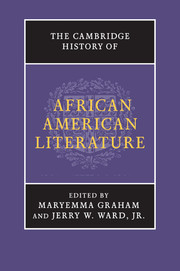Book contents
- Frontmatter
- Introduction
- PART I AFRICAN AMERICAN LITERATURE FROM ITS ORIGINS TO THE TWENTIETH CENTURY
- PART II AFRICAN AMERICAN LITERATURE IN THE TWENTIETH CENTURY
- PART III AFRICAN AMERICAN LITERATURE AS ACADEMIC AND CULTURAL CAPITAL
- 24 Children's and young adult literatures
- 25 From writer to reader: black popular fiction
- 26 Cultural capital and the presence of Africa: Lorraine Hansberry, August Wilson, and the power of black theater
- 27 African American literature: foundational scholarship, criticism, and theory
- 28 African American literatures and New World cultures
- Bibliography
- Index
- References
25 - From writer to reader: black popular fiction
from PART III - AFRICAN AMERICAN LITERATURE AS ACADEMIC AND CULTURAL CAPITAL
Published online by Cambridge University Press: 28 May 2011
- Frontmatter
- Introduction
- PART I AFRICAN AMERICAN LITERATURE FROM ITS ORIGINS TO THE TWENTIETH CENTURY
- PART II AFRICAN AMERICAN LITERATURE IN THE TWENTIETH CENTURY
- PART III AFRICAN AMERICAN LITERATURE AS ACADEMIC AND CULTURAL CAPITAL
- 24 Children's and young adult literatures
- 25 From writer to reader: black popular fiction
- 26 Cultural capital and the presence of Africa: Lorraine Hansberry, August Wilson, and the power of black theater
- 27 African American literature: foundational scholarship, criticism, and theory
- 28 African American literatures and New World cultures
- Bibliography
- Index
- References
Summary
Scholars freely define movements within the African American literary tradition according to type, geographical location, or historical period. Some scholars dismiss the legitimacy of the “popular” as a justifiable category unless they specialize in cultural studies. The trajectory of the tradition, of course, embraces the vernacular, oral origins of the literature and the eighteenth-through twentieth-century prmanifestations; it is aligned with political, social, and cultural movements that are not specifically “literary.” Any vexation scholars feel, then, about “popular” literature negates this fact of the tradition. After 1865, we can identify literary movements in the making of New Negro anthologies to represent the best of the race. It can be argued that there was the consolidation and elaboration of such efforts in the Harlem Renaissance and the Chicago Renaissance. Though the modernist experimentation of the 1930s, 1940s, and 1950s may not have been viewed as movements exactly, the Black Arts Movement (see Chapter 19) obviously was one and may arguably be the last self-conscious effort to represent the race. Works classified as “New Black Aesthetic,” “hip hop,” and “Post-Soul Aesthetic” represent fascinating ideas about changes in black identity. In all of these movements and tendencies, the very notion of what is “popular” or not “popular” but literary is a matter of sustained contention. The notion of the “popular” seems always to be linked not with time but with taste.
- Type
- Chapter
- Information
- The Cambridge History of African American Literature , pp. 655 - 679Publisher: Cambridge University PressPrint publication year: 2011
References
- 1
- Cited by



